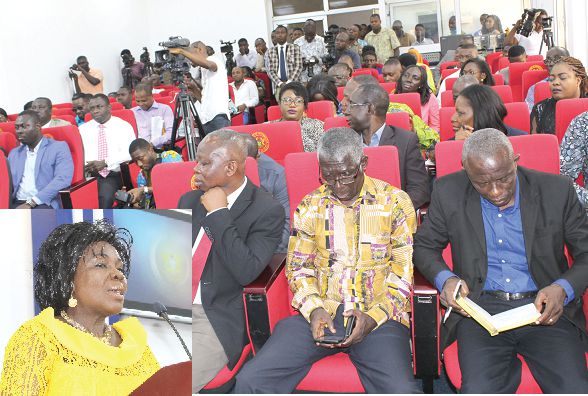
Sanitation Ministry takes turn at meet-the-press
To enhance the enforcement of sanitation laws, the Ministry of Sanitation and Water Resources is compiling all laws in the sector into a comprehensive and consolidated national sanitation law to deal with issues of sanitation more resolutely.
The comprehensive law is expected to reflect the changing trends in the management of environmental sanitation services and address the numerous challenges faced by the sanitation sector.
The Minister of Sanitation and Water Resources, Mrs Cecilia Abena Dapaah, made this known when she took her turn at the Meet-the-Press series in Accra yesterday to update the public on happenings in the sanitation and water sub-sectors.
She said the initiative was part of efforts to ensure strict adherence to the various national and local environmental sanitation laws and regulations.
She added that it would also serve as the primary reference document for the preparation of local bye-laws and enhance the prosecution of sanitation offenders.
The ministry, Ms Dapaah said, was also reviewing the 2010 Environmental Sanitation Policy, which provided guidance and vision for the metropolitan, municipal and district assemblies (MMDAs) to implement sanitation in a more structured and holistic manner.
“It is hoped that this new policy will introduce modernisation in the environmental sanitation sector,” she said.
Poor sanitation
Mrs Dapaah disclosed that poor sanitation cost the country $290 million annually.
Referring to a study by the Water and Sanitation Programme of the World Bank, she said the $290 million was equivalent to $12 per person per year and translated to 1.6 per cent of the national gross domestic product (GDP)
“It makes a lot of economic sense to invest in sanitation; every dollar invested in sanitation yields $5 dividend”, she said.
After calling for investment in sanitation by home owners, the minister urged Ghanaian women not to marry men who had no toilet facilities in their houses, an advice which drew laughter from the gathering.
Management of solid waste
The minister said the management of solid waste, especially in the MMDAs over the years, had been plagued with a number of challenges.
“One of the key challenges is inadequate treatment and final disposal facilities. For example, Ghana can boast only four public engineered landfill facilities, which are located in Tamale, Kumasi, Sekondi-Takoradi and Kpone, near Tema.
A fifth one of relatively small-scale located in Ho has just been completed,” she said.
Unfortunately, Mrs Dapaah said all the four major facilities had been poorly managed over the years, resulting in serious environmental concerns.
To overhaul the waste management infrastructure regime in the country, she said the ministry had embarked on extensive engagement with prospective local and foreign investors to transform the existing poorly managed landfill facilities.
“The new direction of the ministry is to pursue the development of more sustainable waste treatment options such as waste-to-energy, composting and recycling, starting from Kpone and Kumasi,” she said.
Attitude
In spite of the challenges in the sanitation sector, Mrs Dapaah said the delivery of sanitation services in the cities had significantly improved in recent times.
“According to the 2019 Report released by the Ministry of Monitoring and Evaluation, 75 per cent of solid waste generated in the urban centres is now properly managed,” she said.
Meanwhile, the minister emphasised the need for a change of attitude and behaviour, as she said there were important contributory factors in ensuring that cities and major towns were kept clean at all times.
“We should all be mindful of the fact that dealing with the poor sanitation situation in the country is a shared responsibility,” she said.
Sanitation guards
As part of measures to enforce sanitation bye-laws and maintain cleanliness in the communities, Mrs Dapaah said the ministry was facilitating the deployment of sanitation guards, popularly known as ‘saman-saman’ in all metropolitan, municipal and district assemblies (MMDAs) by July, 2019.
The move, she explained, was part of the strategies and measures being adopted by the ministry to improve on the sanitation situation.
She said the ministry was guided by the vision of President Nana Addo Dankwa Akufo-Addo to make Accra the cleanest city in Africa by the end of his tenure.
“This vision is vigorously and vehemently being pursued by the ministry in collaboration with the MMDAs, the private service providers and the other stakeholders,” Mrs Dapaah said.
Water
She also touched on a number of strategic projects that were to be implemented to improve urban water supply for the government to achieve its ‘’Water for All’’ agenda by 2030.
She mentioned some of the projects as the construction of distribution networks to supply water to the Central Tongu, North Tongu, Adaklu and Agotime-Ziope districts, and the Ho Municipality.
